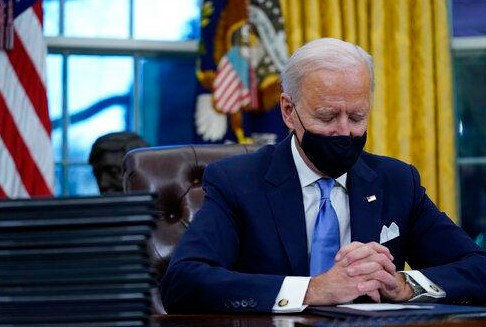
After suspending leases on new oil and gas exploration at the beginning of the year, a new plan by President Biden may now allow for new drilling in the Gulf of Mexico. Oil majors across North America have been pushing Biden to open new leases for exploration across the region, particularly as the President has called on oil and gas firms to increase their output in recent months to support U.S. energy security. As Biden went full steam ahead in his climate change policy, new leases appeared increasingly unlikely, until this month.
- Biden had once pledged to prohibit new drilling on public lands and waters.
- Soaring energy prices, however, may force his hand.
- Not only will new supply help ease consumers’ pain at the pump, it could reinforce America’s position as an energy powerhouse.
The U.S. government announced a five-year offshore oil and gas drilling development this month, that sees the blocking of new drilling in the Atlantic and Pacific Oceans within U.S. waters but allows for some new exploration in the Gulf of Mexico and the south coast of Alaska. Although the plan has not yet been finalized, it is expected that it will permit up to 11 lease sales over the next half a decade, 10 in the Gulf of Mexico and one in Alaska. The plan is currently open for public comment on the matter as Biden asks for the popular opinion of the people on the future of oil and gas.
No offshore auctions will be held until public opinions are gathered and the plan is finalized. Oil and gas auctions have faced controversy in recent months, as a Gulf of Mexico auction was vacated last November with a court order stating that the Department of the Interior had failed to account for the sale’s climate change impact.
Originally, President Biden pledged to prohibit new federal drilling on public lands and waters. This was met with staunch opposition from several members of the Republican party, with numerous states resorting to legal action. The Gulf of Mexico, which accounts for 95 percent of U.S. offshore oil production, was one particular area in question. Now, Biden is feeling the pressure from consumers facing rising energy prices and an oil industry that cannot increase its output as much as the government would like.
Political powers and oil majors in Alaska have also been fighting Biden’s decision to curb drilling in the state over the last year, with ConocoPhillips continuing to plan the development of its major Willow discovery. The U.S. government is facing difficult decisions as its climate policy and the nation’s energy security appear to be at odds. The question now is which road Biden will pick when it comes to energy
But some believe that Biden is going against his climate pledges by presenting the option of new drilling. Interior Secretary Deb Haaland said in a statement this month, “From Day One, President Biden and I have made clear our commitment to transition to a clean energy economy”. He added, “today, we put forward an opportunity for the American people to consider and provide input on the future of offshore oil and gas leasing.” While Haaland was clear in his support for climate change policy, the move suggests that Biden may make some exceptions to his New Green Deal should the plan receive broad public support.
Environmental groups were quick to criticize last week’s plan, suggesting that the government appears to be backing away from Biden’s 2020 “no more drilling” pledge made during a one-on-one debate with Bernie Sanders where he stated “No more drilling on federal lands, no more drilling, including offshore – no ability for the oil industry to continue to drill – period.” Several groups are also concerned that the U.S. may not achieve its climate targets if any new oil and gas operations are approved.
Those in the oil industry are fighting directly against environmentalist organizations in a matter of energy security versus climate change policy. The Democratic senator of West Virginia Joe Manchin, who is an oil industry advocate, stated “Our allies across the free world are in desperate need of American oil and gas… I am disappointed to see that ‘zero’ lease sales is even an option on the table.” While executive director of Healthy Gulf, Cyn Sarthou explained, “Now is not the time to continue business as usual… The continuing threat posed by climate change requires the nation to focus on a transition to renewable energy.”
It seems that the U.S. is somewhat divided on whether new oil and gas leases should go ahead. On the one hand, America and its allies are scrambling to find oil and gas replacements for the shortages seen due to sanctions on Russian energy and delays in the revitalization of global oil operations following the pandemic. On the other, Biden has made clear climate pledges, that were widely supported during his election campaign and respond to Paris Agreement promises. Over the next few months, the will of the public will become clear on the matter, but as consumers face rising energy prices, the result may be somewhat skewed.



